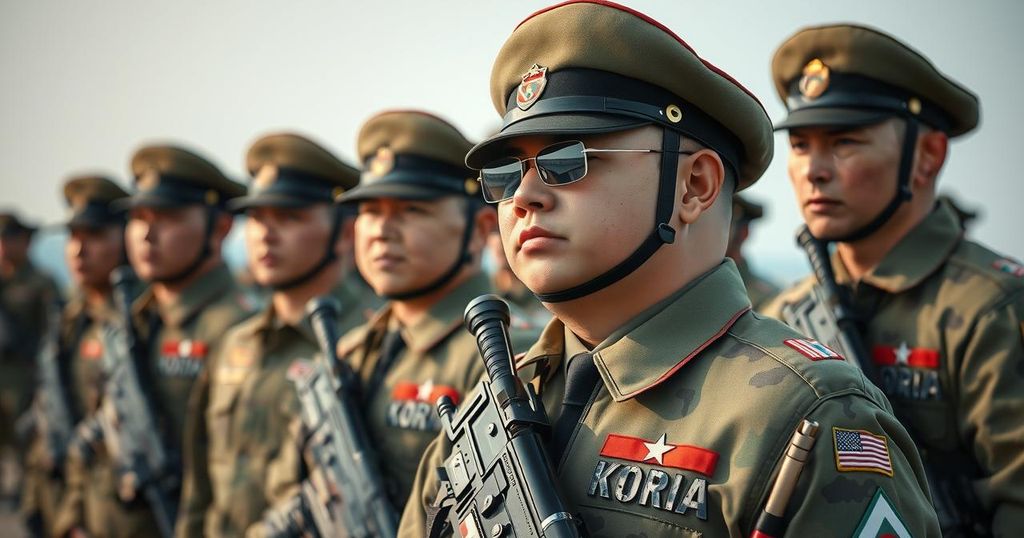Exploring the Challenges Faced by North Korean Soldiers in Russia’s War in Ukraine

Former North Korean soldiers discuss the severe conditions their comrades face while fighting for Russia in Ukraine, revealing issues such as malnourishment and inadequate training. Despite high morale and loyalty to their regime, these troops may struggle to adapt to modern combat due to their ideological indoctrination and lack of resources. Communication challenges and the cultural stigma against surrender complicate potential defection efforts.
Haneul’s recollections as a former North Korean soldier reveal the severe challenges faced by troops under Kim Jong Un’s regime, particularly concerning hunger and inadequate training. He lost significant weight during service, largely due to insufficient rations of corn and cabbage, later supplemented by rice of substandard quality. Despite being categorized among the best-fed units to deter defection, Haneul managed to escape to South Korea in 2012. This personal experience reflects broader issues among 11,000 North Korean soldiers recently sent to assist Russian forces in Ukraine, where reports indicate significant casualties and challenges in adapting to combat in a foreign environment.
The Storm Corps, comprised predominantly of elite units exhibiting high morale, have reportedly been struggling with malnutrition and limited training. As voiced by defectors and experts, these troops lack experience in contemporary warfare, although their ideological dedication remains strong. The North Korean regime, however, has heavily invested its resources in missile and nuclear capabilities rather than the frontline troops. Defectors express skepticism about how well these soldiers will adapt to the distinct combat conditions in Ukraine, given their training backgrounds and dietary deficiencies.
Compounding the difficulties faced by the North Korean soldiers are language barriers, leading to communication issues that have caused accidental firings on Russian units, resulting in casualties. While some analysts may dismiss them as mere cannon fodder, the strong ideological indoctrination and high levels of obedience make them a potential threat. Despite the harsh realities of military life in North Korea, there may be a willingness among these troops to fight, seeing combat abroad as an opportunity for career advancement.
Concerns exist about the ability of Ukrainian officials to persuade these soldiers to defect once integrated into combat operations. Nearly all soldiers are aware of the intense shame associated with capture, as they are instructed to commit suicide rather than surrender. Efforts to conduct psychological operations to encourage defection face potential challenges, given the lack of access to mobile communications. Nonetheless, attempts to offer familiar voices from home may hold some potential in swaying the troops’ actions in battle, albeit the risks remain significant.
The article discusses the plight of North Korean soldiers who were deployed to assist Russian forces in the ongoing conflict against Ukraine. The piece details the dire conditions of the North Korean military, particularly focusing on personal narratives of defectors who reveal the tactical and logistical challenges faced by their fellow soldiers. It highlights their severe undernourishment, lack of contemporary warfare training, and the ideological loyalty that influences their willingness to fight. Additionally, the article addresses the intricate dynamics of military loyalty, regime expectations, and the potential for combatants to be exploited by the state in an international conflict.
In summary, the former North Korean soldiers who participated in the BBC interview provide critical insight into the conditions and capabilities of their comrades currently fighting in Russia’s war against Ukraine. Despite being poorly trained and underfed, the ideological commitment and high morale of these troops raise important considerations regarding their effectiveness and resilience on the battlefield. With potential strategies for defection hindered by cultural stigma and the harsh military doctrine imposed by the regime, their role in this conflict remains a subject of significant concern for global observers.
Original Source: www.bbc.com







